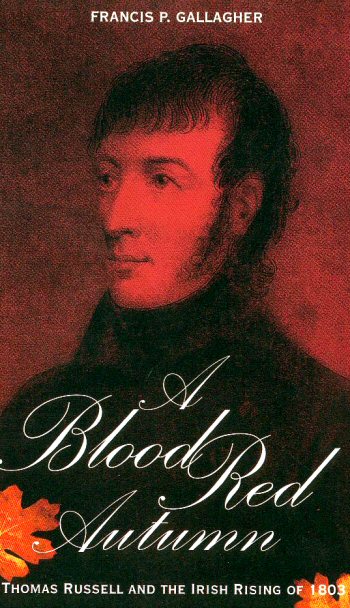‘A Blood Red Autumn: Thomas Russell and the Irish Rising of 1803’ by Francis P Gallagher is designed to shed more light on a subject which till now has received little historical research. The book is available locally at Easons and Waterstones.
Russell is an iconic figure in Irish republican history, a contemporary of and comparable in importance to Danton and other major figures of the French revolution. Yet the movement of which he was a central figure and inspired thinker was not originally in favour of armed rebellion but designed to achieve peaceful change by mass, united action. Russell was imprisoned and thus not part of the ’98 Rebellion but still on his release in 1802, was fired with love of and concern for the poor and with loyalty to his colleagues. Like John Mitchel, now laid to rest in Newry, most Irish people are unaware of Russell, his ideals and what he tried to achieve.
It is often said that today’s politics is tomorrow’s history so it makes sense for people to understand their history if they are to discover more about how the world works and how politics impacts upon our lives. History should be the most important subject on the school curriculum because, properly taught and interpreted it teaches one to think independently. We need more free thinkers if we are to solve many of our problems in
The book shows how Russell grappled with the political realities of his day to rise above tradition and to build something new. His ideas were refreshing and thought provoking and still relevant.
Gallagher attempts to show the contradictions that are inherent in interesting men like Russell. His moral commitment to his political ideals stand juxtaposed to his love of chasing women whom he described as ‘fair game’ in his nightly excursions round Belfast. Russell was also very sensitive by nature and he was capable of the most enduring love for women such as Eliza Goddard from Newry, whose father was a customs official in the town.
Russell’s focus on the idea of citizenship is inspiring because it leads us to think of empowerment and how representative parliamentarianism fails to allow people to feel they have power over their daily lives in a world where centralization is increasing. Russell teaches us to be intellectually honest and to address ideas such as how we can make society more democratic and accountable where individuals have more freedom to be better people. Russell knew that economic democracy goes hand in hand with political democracy because one without the other is a form of tyranny in itself. These are all fundamental questions that Russell wrestled with.
As well as admiring Russell for his sincerity and intellect, we can think of him foremost as a human being capable of great love, a sensitive man, who would not want to hurt any living thing but who had the realization that God can be awakened in all of us to achieve great things.
… Eliza Goddard …
… Man from God Knows Where …
